
Phantom Brave is a tactical role-playing game for the PlayStation 2 video game console, developed and published by Nippon Ichi Software. It was released on January 22, 2004 in Japan, on August 31, 2004 in North America and on February 4, 2005 in Europe. The North American release was the first game published by NIS America. The game shipped in two "editions"—Normal and Special—the Special edition coming with a free soundtrack and shortened instruction manual.

Dungeon Siege II is an action role-playing video game, the sequel to 2002's Dungeon Siege. It was developed by Gas Powered Games and released in 2005. The story is a continuation of the Dungeon Siege storyline. An expansion Broken World was released in 2006.
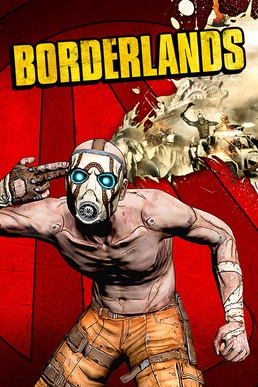
Borderlands is a 2009 action role-playing first-person shooter video game developed by Gearbox Software and published by 2K. It is the first game in the Borderlands series. It was released for PlayStation 3, Xbox 360, Microsoft Windows, Mac OS X and Shield Android TV. The game was released worldwide in October 2009, with the Mac OS X version being released on December 3, 2010, by Feral Interactive. The game's story focuses on a group of four "Vault Hunters", who travel to the distant planet of Pandora to search for the "Vault", which is rumored to contain advanced alien technology and other priceless riches. The hunters piece together clues to find the Vault while battling the savage wildlife of Pandora and the bandits and outlaws that populate the planet, ultimately banding together to prevent the Atlas Corporation and its privately funded paramilitary forces from reaching the Vault first.
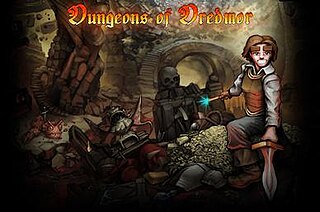
Dungeons of Dredmor is a roguelike indie video game released on July 13, 2011, by Gaslamp Games. A downloadable content (DLC) pack, "Realm of the Diggle Gods", was released later that year. A second DLC, "You Have To Name The Expansion Pack", was released on June 5, 2012, and a third, "Conquest of the Wizardlands", was released on August 1, 2012. The game has extensive support for user-created modifications.

The Binding of Isaac is a roguelike video game designed by independent developers Edmund McMillen and Florian Himsl. It was released in 2011 for Microsoft Windows, then ported to OS X, and Linux. The game's title and plot are inspired by the Biblical story of the Binding of Isaac. In the game, Isaac's mother receives a message from God demanding the life of her son as proof of her faith, and Isaac, fearing for his life, flees into the monster-filled basement of their home where he must fight to survive. Players control Isaac or one of the 33 other unlockable characters through a procedurally generated dungeon in a roguelike manner, fashioned after those of The Legend of Zelda, defeating monsters in real-time combat while collecting items and power-ups to defeat bosses and eventually Isaac's mother.

Awesomenauts was a multiplayer online battle arena (MOBA) video game developed by Dutch video game development company Ronimo Games. The game was released for PlayStation 3 and Xbox 360 consoles in May 2012, and for Microsoft Windows systems in August 2012. It was later ported to OS X and Linux. Another version of the game, Awesomenauts Assemble!, incorporating all the changes and additions available on Windows, OS X and Linux, was released for the PlayStation 4 in March 2014 and for the Xbox One in September 2016. In May 2017, the PC version of the game transitioned to a free-to-play title, incorporating an in-game currency and reward system to allow players to gain access to new characters and other customization aspects. In September 2019, Ronimo Games announced that development on the game has stopped indefinitely. Despite this, Awesomenauts was still available to play, until the servers went offline on 2023-09-15 due to Ronimo's bankruptcy.
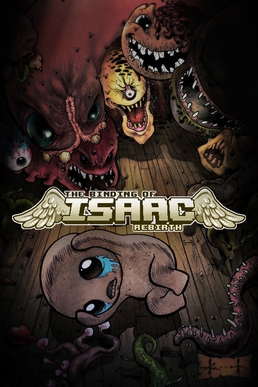
The Binding of Isaac: Rebirth is an indie roguelike video game designed by Edmund McMillen and developed and published by Nicalis. Rebirth was released for Linux, Microsoft Windows, OS X, PlayStation 4 and PlayStation Vita in November 2014, for Xbox One, New Nintendo 3DS and Wii U in July 2015, for iOS in January 2017 and for Nintendo Switch in March 2017. The PlayStation 5 and Xbox Series X/S versions were released in November 2021.

Crypt of the NecroDancer is a roguelike rhythm video game developed and published by Canadian independent game studio Brace Yourself Games. The game takes fundamental elements of a roguelike dungeon exploration game and adds a beat-matching rhythm game set to an original soundtrack written by Danny Baranowsky. The player's actions are most effective when moving the character set to the beat of the current song and are impaired when they miss a beat, so it is necessary to learn the rhythmic patterns that the various creatures follow. The mixed-genre game includes the ability to import custom music, and the option to use a dance pad instead of traditional controllers or the keyboard. The game was released for Linux, OS X, and Windows in April 2015, being co-published by Klei Entertainment, for the PlayStation 4 and Vita in February 2016, for the Xbox One in February 2017, and for Nintendo Switch in February 2018. Crypt of the NecroDancer Pocket Edition, developed for iOS, was released in June 2016.
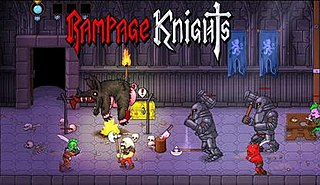
Rampage Knights is a 2015 roguelike video game by Czech developer Rake in Grass.

Dungeon of the Endless is a roguelike tower defense game developed by Amplitude Studios. It is the third game of their loosely connected Endless series, which includes Endless Space and Endless Legend. It was released in October 2014 for Microsoft Windows and Mac OS X systems, August 2015 for iOS devices, and for Xbox One in March 2016. The PlayStation 4 and Nintendo Switch ports were released in May 2020. A revamped version for iOS and Android devices, called Dungeon of the Endless: Apogee, launched in March 2021.
Strafe is a first-person shooter video game developed by Pixel Titans and published by Devolver Digital. The game is an homage to 1990s first-person shooter video games, such as Doom and Quake, advertised as to have "bleeding edge graphics and gameplay", citing the year 1996. It was released worldwide on May 9, 2017.

99 Spirits is a puzzle role-playing video game developed and published in Japan by TORaIKI in July 2012 for Microsoft Windows. It was localized and published in English by Fruitbat Factory on May 31, 2013 after a successful crowdfunding campaign. Two pieces of downloadable content, featuring side-stories presented in a visual novel format, were released in 2014 and 2015.

Adventures of Mana is an action role-playing video game developed by MCF and Square Enix, and published by Square Enix. It is a 3D remake of the 1991 Game Boy game Final Fantasy Adventure, the first game in the Mana series. It was released worldwide for Android and iOS on February 4, 2016; a PlayStation Vita version was also released on the same date in Japan, and in June 2016 in North America, South America and Europe. In addition to these releases, Square Enix has said that they are considering developing versions for PlayStation 4 and personal computers.
Enter the Gungeon is a 2016 bullet hell roguelike game developed by Dodge Roll and published by Devolver Digital. Set in the firearms-themed Gungeon, gameplay follows four player characters called Gungeoneers as they traverse procedurally generated rooms to find a gun that can "kill the past". The Gungeoneers fight against bullet-shaped enemies, which are fought using both conventional and exotic weapons. Enter the Gungeon features a permadeath system, causing the Gungeoneers to lose all obtained items and start again from the first level upon death. Between playthroughs, players can travel to an area called the Breach, where they can converse with non-player characters and unlock new items randomly encountered while playing.
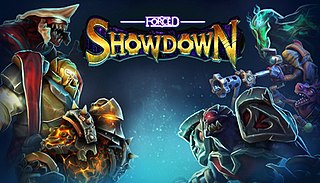
Forced: Showdown is a top-down single-player bullet-hell brawler developed by Danish indie game developer BetaDwarf. The game was released in March 2016 for Windows, OS X and Linux through Steam as well as GOG.com. The game revolves around Contestants fighting for wealth and glory in an ever-changing galactic game show. The gameplay mixes roguelike aspects with a trading-card game. It consists of selecting a champion, enhancing and empowering him and his abilities to battle through hordes of minions and dodging their attacks to survive.

Risk of Rain 2 is a roguelike third-person shooter developed by Hopoo Games and published by Gearbox Publishing. A sequel to 2013's Risk of Rain, it was released in early access for Microsoft Windows, Nintendo Switch, PlayStation 4 and Xbox One in 2019 before fully releasing in August 2020 with a release for Stadia coming a month later.

Runestone Keeper is a roguelike video game developed and published by Blackfire Games, with the iOS version developed by Cimu. It was released on March 23, 2015 for Windows and Mac OS X, October 31, 2015 for iOS, and August 11, 2017 for Android.

Slay the Spire is a roguelike deck-building video game developed by the American indie studio Mega Crit and published by Humble Bundle. The game was first released in early access for Microsoft Windows, macOS, and Linux in late 2017, with an official release in January 2019. It was released for PlayStation 4 in May 2019, for Nintendo Switch in June 2019 and for Xbox One in August 2019. An iOS version was released in June 2020, with an Android version released in February 2021.

Dicey Dungeons is a roguelike deck-building game developed by Irish game designer Terry Cavanagh. It was released for Microsoft Windows, macOS, and Linux in August 2019, for Nintendo Switch in December 2020, for Xbox One and Xbox Series X/S in November 2021, and for PlayStation 4 and PlayStation 5 in February 2023. Ports for iOS and Android were released in July 2022.

Caveblazers is a 2017 video game developed by Rupeck Games and published by Yogscast Games. Described as an "action-focused roguelike platformer", players in Caveblazers defeat enemies across runs of procedurally-generated dungeons to accumulate items, weapons, and potions with random effects. The developers, Rupeck Games, described the design of the game as aiming to "move away from the simplistic combat systems" of other roguelike games to focus on "fast-paced combat". Upon release, the game received generally favorable reviews, with praise directed to the game's roguelike mechanics, customisation and challenging difficulty, and criticism for its lack of variety of environments and enemies. A port of the game for the Nintendo Switch was released the developer under the name Deadpan Games in 2019.


















